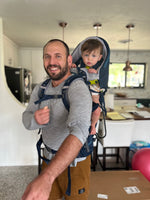No one sets out on a hike with the intention of getting lost. However, every year adventurers get disoriented or suffer an accident, which takes them off course. Those who have prepared themselves for this possibility have the best shot at survival. Here are a few tips to focus on that will increase your chance of getting home safely.
Preparations
PLAN. Before setting out on a hike, plan your route and make sure to bring a compass, map and GPS. Make sure to keep the GPS on when you begin and turn on the tracking feature. Should you ever get off course, you can backtrack your path until you find the trail again.
INFORM. Make sure that someone knows where you're going and when you expect to be back. This way if you do not reach your destination due to an emergency, your friends and family will know where to begin the search.
PREPARE. Carry emergency supplies with you at all times and learn how to use them.
Positive Mental Attitude
In the unlikely event that you should become lost - try to keep calm and think logically. You must STOP! Sit down, Think, Observe and Plan. This will increase your chance of being rescued or finding your way out. When you STOP and maintain a Positive Mental Attitude, you will be more capable of overcoming the obstacles you face. Consider your situation and act accordingly.
Shelter
Even if there is a reasonable chance that you might be rescued fairly quick, make a temporary shelter that will protect you from the environment. If the sun is blasting, make some shade. If it is cold, shield yourself from wind or rain. Hypothermia can be life threatening, and if accompanied by moisture and/or wind, can occur rather quickly. Make use of what you brought and what can find in your surroundings.
Water
Humans can go 3 weeks without food, but only 3 days without water. Water is one of the most important factor when it comes to survival. Hopefully, you will have packed your purification tablets or your portable filtration system for just such an occasion. If you have not, the next item on the list is even more important.
Fire
A fire will allow you to purify water by bringing it to a boiling, as well as provide safety from wild animals, keep you warm and boost your morale. It will also let you cook food that you may be able to kill or scavenge. Make sure in your emergency kit you have a ferro rod, lighter and some vaseline covered cotton balls. If not, you will have to resort to the more basic fire-starting techniques which hopefully you have learned and practiced.
Signals
Learn how to help those that are searching for you and bring attention to your need for help. Make a single fire by adding green wood to your fire to make lots of smoke and attract attention. Carry a whistle and give three long blasts at regular intervals, the sound will carry a long way. Or make the sound for SOS - the international sign of distress. To do so, blow into your whistle with three long blasts, 3 short blasts then 3 more long ones again. You can also use a mirror to reflect light upwards if you hear an airplane or across many miles of flat terrain.
From Spark to Glow: Explore The Ultimate Guide to Starting a Campfire for Beginners – Affordable and Accessible.
Total
$0.00
0


